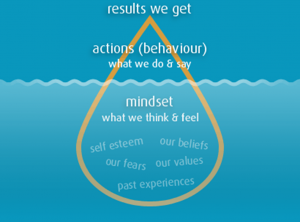If You Don’t Let People Get To Know You, They’ll Make Assumptions
As a more introverted person I don’t like people making assumptions about me but if I don’t let them get to know me then they will make assumptions, they will fill in the gaps. It’s quite the quandary! Introverts give less away than more extroverted people and are more guarded about who they reveal their personal details to. That’s not a criticism, it’s just a fact, the typical behaviour of a more introverted person. We do need to be careful though, that we don’t allow people to make so many assumptions about us that they have no real idea about who we are because then when we do need help, we might not have the energy to explain things that we could have said before. It can be quite hard to help a more introverted person as we want to be able to help ourselves, to look inward and find our own solutions. For the most part that’s OK but sometimes we all do need help from an external source and if we don’t let people get to know us, that can be much harder than it needs to be.
There are lots of labels that are attributed to more introverted people, to include:
- Aloof
- Snobby
- Offhand
- Unfriendly
- Cold
- Reserved
- Unemotional
- Detached
It’s Just Different
Just because our preference is to look inward for our solutions, it doesn’t mean that any of those labels are true. It just means that we give less away about how we are feeling, and in a society where extroversion is seen as more ‘normal’ that can be different to how people are generally expected to behave. It’s not wrong, it’s just different. Introverts will often be asked ‘are you OK?’ because we give very little away about how we’re feeling and even when we’re perfectly happy our faces can look quite stern or thoughtful. It’s just different. Do people smile when they’re driving, if no one else is in the car? No. We’re thinking about what we’re doing and concentrating, so our faces reflect that. Introverts tend not to vocalise their thoughts, we think in our heads and so extroverts can become frustrated with us, with the lack of feedback because their preference is different, to vocalise how they are. It’s just different.
It’s Worth the Risk, Most of the Time
If you’re a more introverted person, it’s worth thinking about who the people are that need to know a little bit more about you than the average person in the street. Telling your colleagues about what you did at the weekend will help them to engage with you and share experiences, which helps to build effective relationships. It’s a risk though isn’t it, because an introverted weekend can often be a thing of silence, calm, reflection and very little contact with others. So telling a more extroverted colleague that you stayed at home all weekend and didn’t venture outside the door might make them think you’re even more strange than they thought you were in the first place!
I’ve had those conversations, when I’ve explained that I did some chores and watched a couple of films on Saturday and then read a book on the Sunday. A whole book, end to end. And yes, they did look at me as if I was strange but over time, (and boy did it take time!) people got to know that while I could be quite outgoing at work (only because I needed to be, it wasn’t always my preference), then I would spend my weekends and evenings very quietly and often alone. And over time, they came to accept that about me. They probably still thought I was a bit odd for wanting such a solitary life outside of work but they did accept it because I explained that I was happy living my life that way, that I needed a balance of being more outgoing and having time to myself. They would still make the assumption that I was an extrovert in denial (that wasn’t annoying at all was it??!!) but they did accept my preferences, knowing that I was highly unlikely to turn up to anything social once the work day was done.
Enabling Support
I believe even the most introverted person should reveal a few personal details to their Line Manager, to explain their personal situation which can inform the level of support offered to them. You can agree what line management support will look like but bear in mind that your Line Manager has a duty of care towards you and so they do need to know your next of kin details, for instance if you don’t turn up for work one morning and haven’t called in, which would be very unlike you! It can feel uncomfortable to talk about ourselves and our situation, especially if we feel judgements and assumptions are going to be made about us but we do have to allow people to exercise that duty of care towards us. It doesn’t mean we have to reveal our deepest, darkest worries and anxieties but we do need to tell someone, at some point if we’re struggling. We have a reciprocal duty of care to allow people to help us, however uncomfortable that feels.

This image of Freud’s Iceberg Model shows us that most people see the part of us that is ‘above the water’ in terms of what we do and say but sometimes we do need to reveal how we think and feel, the part of us that we usually keep more concealed. A more extroverted person will disclose that information more readily than a more introverted person, it’s just different but if that’s something you struggle with, think about the people that might need to know a little bit more about you, to help keep you safe and well. Practice taking the risk with small details first and then build up to the bigger stuff.
This Stuff Takes Practice
I once said to a Line Manager, “I’m really indecisive outside of work, I can never decide which parking space to park in, there’s too much choice!”. He looked at me, slightly confused and said “I don’t believe you”. In his mind I was always decisive and in control so how I possibly struggle with something as simple as picking a parking space! He was making assumptions about me and even when I told him more about me as a person, he rejected my claim because it didn’t fit with what he thought about me. My reaction to that was, “I’ll never tell you anything about myself again” which was a slightly extreme response and turned out not to be true but I was much more cautious about what I told him about myself after that. He didn’t get to know me as well as he could have. He thought I was so professional, organised and in control at work, that any admission of difficulties on my part were not accepted, even when I gave a specific example of how I indecisive I could be. It does take energy and practice to reveal those more personal aspects of who we are but it is worth the effort, eventually.
People Will Make Assumptions Anyway
As we embrace our introversion and the differences between the personality types more, we can start to feel more confident about who we are and share personal details about ourselves, with some people, probably not everyone though! To talk about what we did at the weekend even when we know that people might say “really?!” in response because their preferences are different. I do it deliberately now; “I went to the cinema on my own last night” will usually get quite a surprised response but as it’s the truth, I tell people and let them think of it what they will. There’s great strength in that.
If you’re fed up with people making assumptions about you, help them out a bit and share some personal details, about who you are and what you do when you’ve got time to yourself. People will make judgements and assumptions anyway, so they may as well be half right, even if you’re not going to tell them the whole story! Well, not many of em anyway! ?
Take good care please, enjoy sharing just a little bit and have a great day.
Best wishes, Karen
Email: kw.innerstrength@outlook.com
